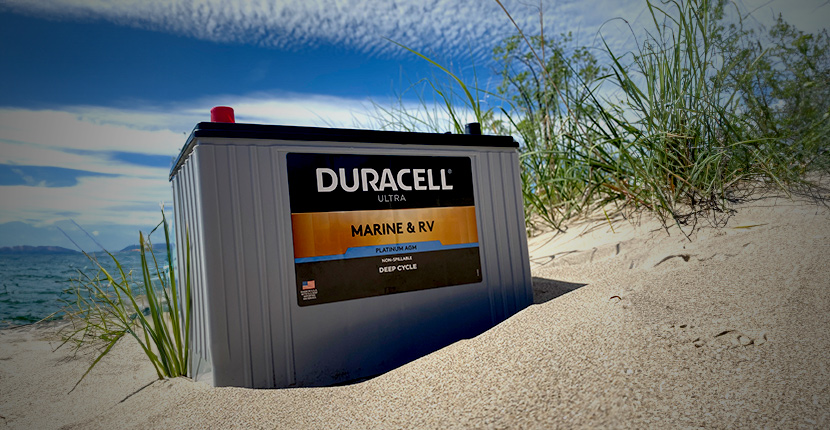How Do I Protect My Battery From Saltwater?
- by Joe Weber - updated on 4/5/2024

Taking the boat out into the ocean is a must-do for several reasons. Saltwater fishing is some of the best (and most challenging) in the world, some of the best SCUBA diving spots to see amazing sea life are in the ocean, whale watching and so many more adventures await. Does salt water affect your battery differently than fresh water? Find out below what salt water can do to your batteries and how to protect them.
How Does Saltwater Affect Batteries?
Compared to freshwater, saltwater is much more corrosive. What does this mean for the batteries in your seafaring boats? It's not like you are submerging your batteries in the saltwater, so how bad could it be, right?
In a sense, wrong. Saltwater can wreak havoc on metals and electronics. Prolonged exposure to saltwater can quickly lead to battery problems when issues are not addressed quickly.
Saltwater contains 3.5% sodium chloride, this can vary a bit if the saltwater is in an area that also mixes with freshwater. The presence of salt makes seawater much more likely to cause corrosion on metals. This is because seawater conducts electricity better than fresh water, and chloride ions can break through the thin layers that form on metals to protect them, increasing the rate of corrosion buildup on the terminals and even the lead plates inside the batteries.
Why does saltwater speed up the corrosion process?
While all water can cause corrosion, saltwater is particularly damaging due to its highly conductive nature. Pure water is not conductive but when salt or sodium chloride (NaCl) are dissolved in it, it becomes highly conductive. Traces of salt water can seep into the battery and cause damage at a much greater rate.
When dissolved in water the salt molecules split into two pieces, a sodium ion, and a chlorine ion. The sodium ion is missing an electron, giving it a positive charge. The chlorine ion has an extra electron, giving it a negative charge.
Saltwater then acts as an electrolyte solution. It speeds up the oxidation process of metals that it comes in contact with.
Why is corrosion bad for boat batteries?
If you want your batteries to fail early, forcing you to spend hundreds of dollars replacing them earlier than you need to, introduce them to corrosion.
Over time, built-up corrosion on battery terminals can interfere with the flow of electricity. This could potentially cause two things to happen:
- Weaken the battery's ability to hold a charge
- Can eventually lead to a sudden short circuit.
Even worse, unchecked corrosion can permanently damage the battery, shortening its lifespan and forcing you to replace it more frequently.
Protect Your Batteries With Battery Boxes
Marine batteries are an investment and no matter what type of water you use your boat in, you should protect your investment. One of the cheapest and easiest ways to do that is to use battery boxes.
Battery boxes will help protect your batteries from the elements when you're out on the water. They come in a variety of sizes, are made from durable materials and completely enclose your battery while still allowing enough air so batteries can vent.
It's important to note that each battery box is designed to fit a single and specific battery size. If you are using multiple batteries on your boat, you will need multiple boxes.
Saltwater Also Harms Electronics and Other Items
Batteries aren't the only thing that will see sped-up wear and tear with exposure to saltwater.
Any SCUBA diver will know what I mean. After a saltwater dive, SCUBA divers will rinse off all of their gear in a freshwater tank as soon as they get out of the water. When saltwater dries, it leaves salt crystals that can damage dive gear as well as the wetsuit if not washed off right away.
Electronics are no exception. Saltwater will speed up corrosion on any electronics that it comes in contact with. If you have electronic equipment on your boat you should take precautions to minimize the saltwater spray and intrusion into the sensitive components of your gear. Cover them with waterproof rags or cases if possible and wipe away any saltwater that may have splashed onto gear before it has a chance to dry.
Test Your Marine Batteries Often
To stay on top of any potential issues with your batteries, you should test them often. It doesn't matter if it's a boat used in freshwater or saltwater, you should test them or have them tested at the very least at the beginning and end of the season. The above link is for testing the voltage of a car battery but the testing process is the same for your lead-acid boat batteries.
Our X2Power lithium marine batteries with Bluetooth allow you to track the status of the battery in the X2Power app (Available on the Apple App Store and Google Play ).
If you are unsure of how to test or you would just rather have the experts at Batteries Plus do it, bring them to your nearest Batteries Plus location and we will be happy to test them for you free of charge.
Need A New Boat Battery?
If your current battery is weighing you down and a new one is needed to get the most out of your boating season, stop by the closest Batteries Plus and our battery experts will guide you through all of your options. From Duracell Ultra to X2Power, we have all of the marine batteries you could ever need.